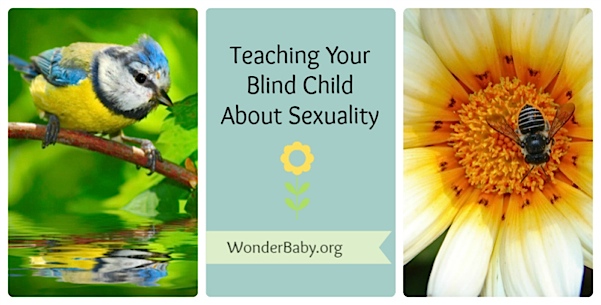Teaching Your Blind Child About Sexuality

We recently had the opportunity to attend the LCA family conference in Cleveland, Ohio hosted by the Foundation for Retinal Research. We had a great time meeting families and attending both parenting sessions and medical presentations.
One of the most interesting parenting sessions was delivered by Judith Lesner on teaching sexuality to blind children. The following article is based on notes we took during her presentation:
Talking about sex with your kids can be awkward and scary, but we all know that teaching sexuality to our children is far more important than teaching them table manners or how to tie their shoes. It’s just a matter of learning how to approach the subject confidently and comfortably.
If your child is blind or visually impaired, you may be feeling even more at a loss. How can you talk about something that is so visual? How can you describe something that really needs to be touched to be understood… but is inappropriate to touch?
A big barrier to teaching sexuality to blind children is that so much of sexuality is dependent on social rules and so many of those rules are learned visually. For example, if you see a scantily clad woman on the subway you may notice that the men ogle her while the women grimace. All of these reactions teach children about male and female relations and about cultural dress codes, yet not a single word was spoken. How will your blind child learn the same set of sexual rules that their sighted peers pick up naturally?
Obviously you are going to have to work a bit harder than other parents. It’s critical that your child learn your culture’s sexual rules, because if they don’t there will be trouble: Boys who break the rules may be thought of as predators; girls who break the rules often become vulnerable victims.
But here’s the good news: The task really isn’t as daunting as you may think! Here’s some valuable, practical advice to set you on the right path:
- Get started early!
When your child is still a baby you can begin teaching them the names of all their body parts and speak openly about how mommies and daddies are different. As they get older it’s important to teach them who they can touch and who they can’t touch (and vice versa, who can or can’t touch them). Remember, it’s OK for a baby to touch mommy’s breast, but an eight or nine year old should have moved on. - Don’t baby your child.
Blind kids tend to rely on their parents and families more than their sighted peers and often seem to grow up a little bit slower. There’s definitely something nice about the fact that your thirteen year old still likes to cuddle up in your lap, but be sure not to treat your thirteen year old teenager like a three year old toddler! Teenaged kids who are pampered and sheltered won’t know how to take care of themselves or how to behave appropriately in public. They may not act their age or participate in age-appropriate activities and this can cause predators to target them. They may be more vulnerable or they may simply act out in ways that will make others uncomfortable (like hugging or grabbing total strangers). Remember, just because it was cute when your child was little, doesn’t mean that everyone thinks it’s cute now! Let your child choose their own clothes, decorate their own room, listen to their own music, and develop their own personality so that they can act their age and move through society with more confidence. - Don’t tolerate bad behavior.
Teach your child how to act appropriately for their age, even if they seem small or young to you. Your little sixteen year old boy may seem big and husky to a stranger and they may not appreciate the big bear hug he’s giving them! Even if they grimace and say, “Oh, it’s OK,” they don’t really mean it. Make sure your child knows that hugging (or groping, etc) strangers isn’t acceptable behavior. - Describe the visual world.
Provide a running commentary for your child about what’s going on around them. This is a great way to teach your child about social cues that they may be missing out on. When your child is young it can be very helpful to tell them how other kids in the room are interacting with each other or let him know when someone is smiling or frowning. As your child gets older you can begin pointing out how society works and how we all make judgement calls every day. For example, you may see a couple of rowdy men up ahead on the sidewalk and decide to cross the road. You could say to your child, “I see a couple of men ahead of us who look drunk and sound as if they are about to get into a fight. I think it would be safer for us to cross the road here and avoid them.” Through this simple statement your child has learned how to identify the sounds of people you should avoid and how to get out of their way. - Use correct anatomical terms and say them with confidence.
It’s OK to have family names for genitals or toileting, but it’s very important that your child is also familiar with the standard anatomical names for genitals. Your child needs to know how to talk about sexuality with other adults in their life in a way that will be understood by everyone. Remember, no matter how close you are to your children, they may not come to you when in trouble, they may first approach a teacher or doctor and they need to be able to speak directly to them. It’s also important to say these words clearly and with confidence. Try it right now. Say, “Penis.” Say, “Vagina.” There, that wasn’t so hard was it? If you sound uncomfortable when talking about your child’s genitals, they’ll begin to associate those areas with fear and embarrassment, and you don’t want that. - Teach your child to draw the drapes and close the door.
This one may seem simple but it’s pretty easy to forget. Since your child can’t see, it may not occur to them to close the door when getting dressed. Fast forward a few years to college and imagine your daughter getting dressed for class in her co-ed dorm with the door wide open and you’ll see why it’s so important to teach this basic concept! - Encourage peer interaction.
It’s natural for all parents to want to keep their kids young for as long as possible: Young kids are sheltered and unaware of the big bad world. But kids grow up and sometimes visually impaired kids need a nudge in the right direction. It may be hard to let go, but it’s important to let your kids get out on their own and to interact with other kids their own age. As a parent, you may need to push your child into new experiences (like summer camp) in order to facilitate their development into adulthood. - Teach mobility.
It’s tough to be independent and socially aware if you can’t get anywhere on your own. You’ll need to make sure your child receives adequate Orientation and Mobility training at school and then encourage them to move about independently at home and around town. - Teach stranger awareness.
It’s important for all kids to know the basic rules of stranger awareness: Don’t talk to strangers; Don’t get in a stranger’s car; Don’t accept gifts from strangers, etc. But it’s also important to make sure that your child knows who a stranger is. Is the lady waiting in line with you at the check out line a stranger? You bet! How about that nice old man looking for his lost puppy? Definitely! Sometimes we make “strangers” seem so forboding and scary that children forget that just about anyone really can be a stranger, even people who seem nice.  Teach body difference.
Teach body difference.
It can be difficult to teach visually impaired kids about the difference between men and women without touch. But there are some great products out there that can help.Teach-A-Bodies Dolls are anatomically correct plush dolls that parents and teachers can use to teach kids about body differences. Jim Jackson Anatomy Models are designed for sex education and are life size and made of soft latex for a realistic feel. You can also find braille books with tactile images for your teenaged kids. Check out The Period Book for girls and What’s Going on Down There? for boys. And remember, if your child’s school has sex education on the curriculum then ask that these books and products be part of the classroom. Write these things into your child’s IEP as part of their accommodations/adaptations for the year.

Successfully teaching your child about sexuality isn’t done in one “talk.” It takes years of incorporating healthy habits into your child’s life and learning how to take every opportunity to teach your child about society and its norms.
But don’t worry, it isn’t as hard as it sounds. Just start with an open mind and a willing attitude and you’re child will do great… and so will you!
Judith Lesner worked in the residential program at the California School for the Blind for eleven years and is now retired. She still works with the Lucky Touch Braille Fortune Cookie Company. She is also co-chair of the Blind Babies Foundation Professional Advisory Committee, Member-at-Large on NAPVI‘s board, on California’s NAPVI affiliate’s board, and works with Family Voices of California.

Read this article in Arabic: حيوا-السيدة-العمياء
Related Posts

Eye Conditions and Syndromes, Visual Impairment
Neuralink Announces Plans to Restore Sight to the Blind with Brain Chip
Elon Musk’s company Neuralink has announced plans to begin human trials of its new “Blindsight” brain chip by the end of 2025.

Visual Impairment
The Gift of Understanding: How a Young Child Helps His Blind Father Navigate Life
When a parent is blind, it’s natural for people to wonder how their sighted child will adapt. Will they struggle to understand their parent’s needs? Will they feel burdened by...

Braille and Literacy, Toys, Visual Impairment
24 Braille Toys for Kids Who are Blind
Everything from alphabet blocks to raised line coloring pages and activity books to puzzles to card and board games... and so much more! And it's all in braille ready for...